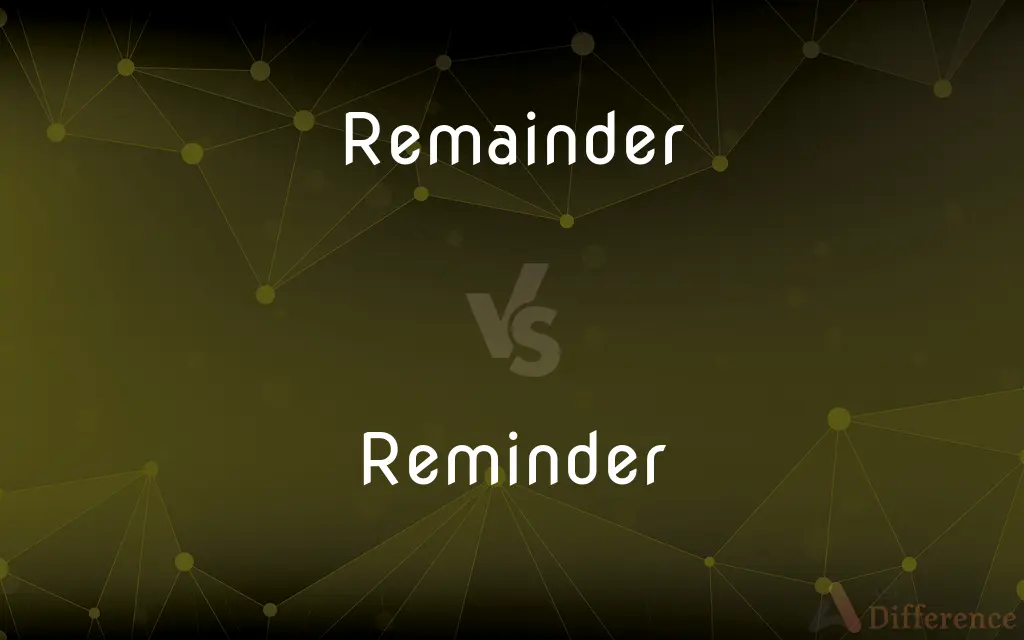Remainder vs. Reminder — What's the Difference?
By Tayyaba Rehman — Updated on October 25, 2023
"Remainder" refers to the part that is left when the other part is taken away. "Reminder" is something that causes someone to remember or is used to aid memory.

Difference Between Remainder and Reminder
Table of Contents
ADVERTISEMENT
Key Differences
"Remainder" is a noun primarily used in the context of mathematics or in general scenarios when describing what is left of something after a part is removed or used. It might refer to the residual amount in division or the unsold portion of something in commercial terms. "Reminder", on the other hand, pertains to causing someone to remember or recollect an event, task, or detail. It generally implies an aid or prompt to memory.
In mathematical problems, particularly in division, the "remainder" is the amount left over after division when one number does not divide the other exactly. For instance, when you divide 13 by 5, the quotient is 2, but there is a "remainder" of 3. In contrast, a "reminder" might be a note or an alarm set on your phone to remember an upcoming appointment or task.
From a commercial viewpoint, if a bookstore orders a hundred copies of a book and sells eighty-five, the fifteen unsold copies represent the "remainder". This term can also apply to the residual of any product or item. Meanwhile, a "reminder" in this context could be a notification sent to customers about a pending payment or an upcoming sale.
In summary, while "remainder" denotes what is left from a whole after a part has been taken or used, "reminder" signifies a tool, method, or instance meant to jog or boost one's memory about something.
Comparison Chart
Purpose
Indicates what's left
Aids memory
ADVERTISEMENT
Context
Mathematics, commercial sales
Tasks, appointments, events
Usage
Describes a residual amount or portion
Used to prompt or help recall
Related Terms
Quotient, divisor
Memo, notification, alarm
Grammatical Function
Noun, often used as a subject or object in a sentence
Noun, can be the subject or object of a sentence
Compare with Definitions
Remainder
A book sold at a reduced price by the publisher after sales have slowed.
I found some great titles in the remainder bin.
Reminder
A note or alert meant to jog memory.
I set a reminder for our meeting tomorrow.
Remainder
The amount left over after division of integers.
When 11 is divided by 3, the remainder is 2.
Reminder
An indication or warning.
The ruins are a somber reminder of the city's past.
Remainder
The part that is left when the other part is taken away.
After the sale, the remainder of the books were donated.
Reminder
Something that causes someone to remember.
Your story was a reminder of my college days.
Remainder
An estate's residual assets after payment of debts and bequests.
The remainder of the estate went to charity.
Reminder
A tool or mechanism that prompts action.
Can you send me a reminder about the bill?
Remainder
Something that remains or is left.
The remainder of the day was spent relaxing.
Reminder
To cause to remember; put in mind
Must remind him to call.
Reminded her of college days.
Remainder
In mathematics, the remainder is the amount "left over" after performing some computation. In arithmetic, the remainder is the integer "left over" after dividing one integer by another to produce an integer quotient (integer division).
Reminder
Someone or something that reminds.
He left a note as a reminder to get groceries.
Remainder
A part of something that is left over when other parts have been completed, used, or dealt with
The remainder of the year
Leave a few mushrooms for garnish and slice the remainder
Reminder
(finance) Writing that reminds of open payments.
She ignored first the reminder of 80 cents. At the end, she was sentenced to pay 200 euros!
Remainder
A property interest that becomes effective in possession only when a prior interest (created at the same time) ends.
Reminder
One who, or that which, reminds; that which serves to awaken remembrance.
Remainder
Dispose of (a book left unsold) at a reduced price
Titles are being remaindered increasingly quickly to save on overheads
Reminder
A message that helps you remember something;
He ignored his wife's reminders
Remainder
Something left over after other parts have been taken away.
Reminder
An experience that causes you to remember something
Remainder
The number left over when one integer is divided by another
The remainder plus the product of the quotient times the divisor equals the dividend.
Reminder
Someone who gives a warning so that a mistake can be avoided
Remainder
The number obtained when one number is subtracted from another; the difference.
Reminder
Evidence or proof of something past.
Old photos serve as a reminder of our younger days.
Remainder
(Law) An estate in property that takes effect after the expiration of another estate, as where one party is given the right to occupy a property for that party's lifetime, and then another party is given the same right after the first party's death.
Remainder
A book that remains with a publisher after sales have fallen off, usually sold at a reduced price.
Remainder
To sell or dispose of as a remainder.
Remainder
A part or parts remaining after some has/have been removed.
My son ate part of his cake and I ate the remainder.
You can have the remainder of my clothes.
Remainder
(mathematics) The amount left over after subtracting the divisor as many times as possible from the dividend without producing a negative result. If n (dividend) and d (divisor) are integers, then n can always be expressed in the form n = dq + r, where q (quotient) and r (remainder) are also integers and 0 ≤ r < d.
17 leaves a remainder of 2 when divided by 3.
11 divided by 2 is 5 remainder 1.
Remainder
(mathematics) The number left over after a simple subtraction
10 minus 4 leaves a remainder of 6
Remainder
(commerce) Excess stock items left unsold and subject to reduction in price.
I got a really good price on this shirt because it was a remainder.
Remainder
(legal) An estate in expectancy which only comes in its heir's possession after an estate created by the same instrument has been determined
Remainder
Remaining.
Remainder
To mark or declare items left unsold as subject to reduction in price.
The bookstore remaindered the unsold copies of that book at the end of summer.
Remainder
Anything that remains, or is left, after the separation and removal of a part; residue; remnant.
If these decoctions be repeated till the water comes off clear, the remainder yields no salt.
Remainder
The quantity or sum that is left after subtraction, or after any deduction.
Remainder
An estate in expectancy, generally in land, which becomes an estate in possession upon the determination of a particular prior estate, created at the same time, and by the same instrument; for example, if land be conveyed to A for life, and on his death to B, A's life interest is a particuar estate, and B's interest is a remainder, or estate in remainder.
Remainder
Remaining; left; left over; refuse.
Which is as dry as the remainder biscuitAfter a voyage.
Remainder
Something left after other parts have been taken away;
There was no remainder
He threw away the rest
He took what he wanted and I got the balance
Remainder
The part of the dividend that is left over when the dividend is not evenly divisible by the divisor
Remainder
The number that remains after subtraction; the number that when added to the subtrahend gives the minuend
Remainder
A piece of cloth that is left over after the rest has been used or sold
Remainder
Sell cheaply as remainders;
The publisher remaindered the books
Common Curiosities
In division, what does "remainder" represent?
"Remainder" represents what's left over after division when one number doesn't divide the other exactly.
How can "reminder" be used in technology?
In tech, a "reminder" can be an app notification, alarm, or calendar prompt.
In commerce, what might a "remainder" mean?
It could refer to unsold items or the portion of goods left after sales.
Is a "reminder" always in the form of a note or alert?
No, a "reminder" can be any prompt, like an object, story, or even a sensation.
Can "remainder" be used outside of mathematics?
Yes, "remainder" can refer to any residual portion, like unsold items or leftover time.
Can "remainder" be used as a verb?
Less commonly, but it can mean to be left after others have gone, e.g., "I remained."
Can a "reminder" be unintentional?
Yes, even unplanned events or objects can serve as reminders.
Can "remainder" refer to people?
Yes, like when referring to "the remainder of the group."
What's another word for "reminder"?
"Memo" or "notification" can be synonyms for "reminder."
Can a feeling act as a "reminder"?
Yes, feelings can evoke memories, serving as reminders of past events.
Is "remainder" always smaller than the original amount?
Yes, by definition, a "remainder" is what's left after a portion is taken.
What's a digital tool for "reminders"?
Calendar apps, to-do list apps, or alarm functions can serve as digital reminders.
Does "remainder" always denote something unwanted?
No, "remainder" neutrally denotes what's left, without a positive or negative connotation.
Are "reminders" always physical?
No, they can be intangible, like memories or feelings.
Is "remainder" synonymous with "residue"?
They're similar, but context matters. "Remainder" often suggests a larger leftover portion than "residue."
Share Your Discovery

Previous Comparison
Import vs. Upload
Next Comparison
Utensil vs. EquipmentAuthor Spotlight
Written by
Tayyaba RehmanTayyaba Rehman is a distinguished writer, currently serving as a primary contributor to askdifference.com. As a researcher in semantics and etymology, Tayyaba's passion for the complexity of languages and their distinctions has found a perfect home on the platform. Tayyaba delves into the intricacies of language, distinguishing between commonly confused words and phrases, thereby providing clarity for readers worldwide.















































